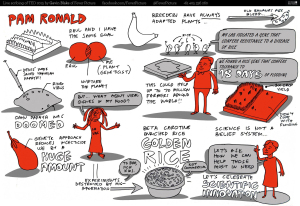Listed here are a variety of resources to get you started on your scicomm journey, beginning with the basics. Importantly, we are a resource. Participate in our events to build your scicomm skills and practice them with us through blogs, video-making, or other projects you have in mind. You can put these events and skills on your progress reports for fellowships, individual development plans, or CV under professional development or outreach. If you want to be more involved, email us at davissciencesays@gmail.com.
Scicomm 101
- What is Scicomm
- Know your Audience
- Jargon Omission Tool
- Compass Message Box
- Science Through Story
- Storytelling Workshop
- Science Writing Career Resources
- Scientists, Meet #Twitter!
- Capital Science Communicators
Science Reporting Resources
- Science Reporting Worksheet
- Science in the Newsroom's 10 Tips for Reporting Science
- Scientific American's advice on explaining your science to the public
Science Communication Opportunities
- Sacramento Powerhouse Communication - Central Dogma of Biology Teaching Module
- Biotoons
- Frontiers for Young Minds
- Montgomery Elementary Science Fair
Fellowships, Internships and Conferences
- AAAS Mass Media Science and Engineering Fellowship
- California Council on Science and Technology Fellowship
- National Cancer Institute Communications Fellowship
- UC Davis' Designated Emphasis in Biotechnology science communication internship
- Science Talk
- ComSciCon
UC Websites
- UC Berkeley CLEAR
- SciComm @ UCR
- UC Davis Innovation Institute
- UC Global Food Initiative
- UC Davis Ag Sustainability Institute
- ucbiotech.org
- UC Cooperative Extension/Agricultural Experiment Station
- UC Davis Seed Biotechnology Center
- UC Integrated Pest Management (IPM) Program
- UC Davis Dining Services Sustainability and Nutrition
- UC Davis Aggie Compass
- UC Food Observer blog
- UC Davis Department of Nutrition
- UC Davis Agronomy Research and Information Center
Academic and Research Organizations
- Cornell Alliance for Science
- The Laboratory for Crop Genetics Innovation & Scientific Literacy
- International Rice Research Institute
- Agriculture is America
- Purdue: The Science of GMOS
Government Agencies
- Environmental Protection Agency (EPA) - Food Security
- Food and Drug Administration (FDA) - Food
- USDA APHIS Biotechnology Regulatory Services
- USDA Food Safety
- House Committee on Agriculture
- USDA Food and Nutrition
- US Drought Portal
- California Drought
- USDA irrigation and water use
- USDA Energy
- USDA Natural Resources Conservation Service
- USDA Soil health
Non-Profits and Industry Organizations
- Technology, Entertainment and Design (TED) Talks
- The Good Doctor interview with Pamela Ronald
- Best Food Facts
- Bill and Melinda Gates Foundation - Agricultural Development
- Biology Fortified
- The Golden Rice Project
- GMOAnswers
- International Food Information Council Foundation (IFIC)
- Capital Science Communicators
- National Association of Science Writers
Media Outreach
- VIDEO: Where do farmers get their seeds?
- VIDEO: What do "natural" food labels mean?
- UC Berkeley CLEAR VIDEO: What is monoculture?
- Modern Agriculture Buzzwords Infographic
- Barbara McClintock on the $10 bill campaign
- Chipotle Flier
Science Policy
- National Science Policy Network (NSPN)
- Mentorship, Training, and Events!
- Journal of Science Policy & Governance (JSPG)
- Publications & Editing, Speaking Engagements, Workshops, Podcast, and more!
- Science and Technology Policy Academy
Science Fun for All Ages
Certain content on this website has been created with full academic freedom of expression by early career scientists at the University of California. Through our projects, Science Says, early career scientists are refining effective scientific communication practices under the guidance of UC faculty. We strive to present fact-based information grounded in the primary scientific literature. If you notice any facts that conflict with the primary literature, please send us the publication and we will review our project content to make sure we are representing the current scientific consensus. Questions, comments or suggestions should be directed to davissciencesays@gmail.com.

